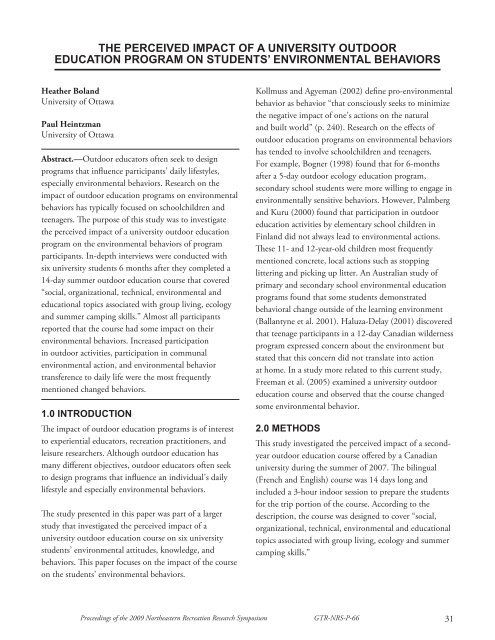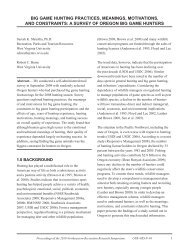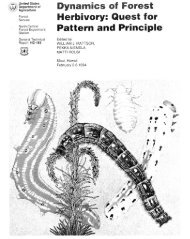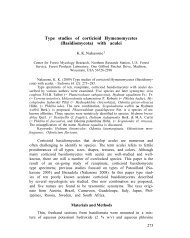Proceedings of the 2009 northeastern recreation research symposium
Proceedings of the 2009 northeastern recreation research symposium
Proceedings of the 2009 northeastern recreation research symposium
Create successful ePaper yourself
Turn your PDF publications into a flip-book with our unique Google optimized e-Paper software.
THE PERCEIVED IMPACT OF A UNIVERSITY OUTDOOR<br />
EDUCATION PROGRAM ON STUDENTS’ ENVIRONMENTAL BEHAVIORS<br />
Hea<strong>the</strong>r Boland<br />
University <strong>of</strong> Ottawa<br />
Paul Heintzman<br />
University <strong>of</strong> Ottawa<br />
Abstract.—Outdoor educators <strong>of</strong>ten seek to design<br />
programs that infl uence participants’ daily lifestyles,<br />
especially environmental behaviors. Research on <strong>the</strong><br />
impact <strong>of</strong> outdoor education programs on environmental<br />
behaviors has typically focused on schoolchildren and<br />
teenagers. Th e purpose <strong>of</strong> this study was to investigate<br />
<strong>the</strong> perceived impact <strong>of</strong> a university outdoor education<br />
program on <strong>the</strong> environmental behaviors <strong>of</strong> program<br />
participants. In-depth interviews were conducted with<br />
six university students 6 months after <strong>the</strong>y completed a<br />
14-day summer outdoor education course that covered<br />
“social, organizational, technical, environmental and<br />
educational topics associated with group living, ecology<br />
and summer camping skills.” Almost all participants<br />
reported that <strong>the</strong> course had some impact on <strong>the</strong>ir<br />
environmental behaviors. Increased participation<br />
in outdoor activities, participation in communal<br />
environmental action, and environmental behavior<br />
transference to daily life were <strong>the</strong> most frequently<br />
mentioned changed behaviors.<br />
1.0 INTRODUCTION<br />
Th e impact <strong>of</strong> outdoor education programs is <strong>of</strong> interest<br />
to experiential educators, <strong>recreation</strong> practitioners, and<br />
leisure <strong>research</strong>ers. Although outdoor education has<br />
many diff erent objectives, outdoor educators <strong>of</strong>ten seek<br />
to design programs that infl uence an individual’s daily<br />
lifestyle and especially environmental behaviors.<br />
Th e study presented in this paper was part <strong>of</strong> a larger<br />
study that investigated <strong>the</strong> perceived impact <strong>of</strong> a<br />
university outdoor education course on six university<br />
students’ environmental attitudes, knowledge, and<br />
behaviors. Th is paper focuses on <strong>the</strong> impact <strong>of</strong> <strong>the</strong> course<br />
on <strong>the</strong> students’ environmental behaviors.<br />
Kollmuss and Agyeman (2002) defi ne pro-environmental<br />
behavior as behavior “that consciously seeks to minimize<br />
<strong>the</strong> negative impact <strong>of</strong> one’s actions on <strong>the</strong> natural<br />
and built world” (p. 240). Research on <strong>the</strong> eff ects <strong>of</strong><br />
outdoor education programs on environmental behaviors<br />
has tended to involve schoolchildren and teenagers.<br />
For example, Bogner (1998) found that for 6-months<br />
after a 5-day outdoor ecology education program,<br />
secondary school students were more willing to engage in<br />
environmentally sensitive behaviors. However, Palmberg<br />
and Kuru (2000) found that participation in outdoor<br />
education activities by elementary school children in<br />
Finland did not always lead to environmental actions.<br />
Th ese 11- and 12-year-old children most frequently<br />
mentioned concrete, local actions such as stopping<br />
littering and picking up litter. An Australian study <strong>of</strong><br />
primary and secondary school environmental education<br />
programs found that some students demonstrated<br />
behavioral change outside <strong>of</strong> <strong>the</strong> learning environment<br />
(Ballantyne et al. 2001). Haluza-Delay (2001) discovered<br />
that teenage participants in a 12-day Canadian wilderness<br />
program expressed concern about <strong>the</strong> environment but<br />
stated that this concern did not translate into action<br />
at home. In a study more related to this current study,<br />
Freeman et al. (2005) examined a university outdoor<br />
education course and observed that <strong>the</strong> course changed<br />
some environmental behavior.<br />
2.0 METHODS<br />
Th is study investigated <strong>the</strong> perceived impact <strong>of</strong> a secondyear<br />
outdoor education course <strong>of</strong>f ered by a Canadian<br />
university during <strong>the</strong> summer <strong>of</strong> 2007. Th e bilingual<br />
(French and English) course was 14 days long and<br />
included a 3-hour indoor session to prepare <strong>the</strong> students<br />
for <strong>the</strong> trip portion <strong>of</strong> <strong>the</strong> course. According to <strong>the</strong><br />
description, <strong>the</strong> course was designed to cover “social,<br />
organizational, technical, environmental and educational<br />
topics associated with group living, ecology and summer<br />
camping skills.”<br />
<strong>Proceedings</strong> <strong>of</strong> <strong>the</strong> <strong>2009</strong> Nor<strong>the</strong>astern Recreation Research Symposium GTR-NRS-P-66<br />
31
















